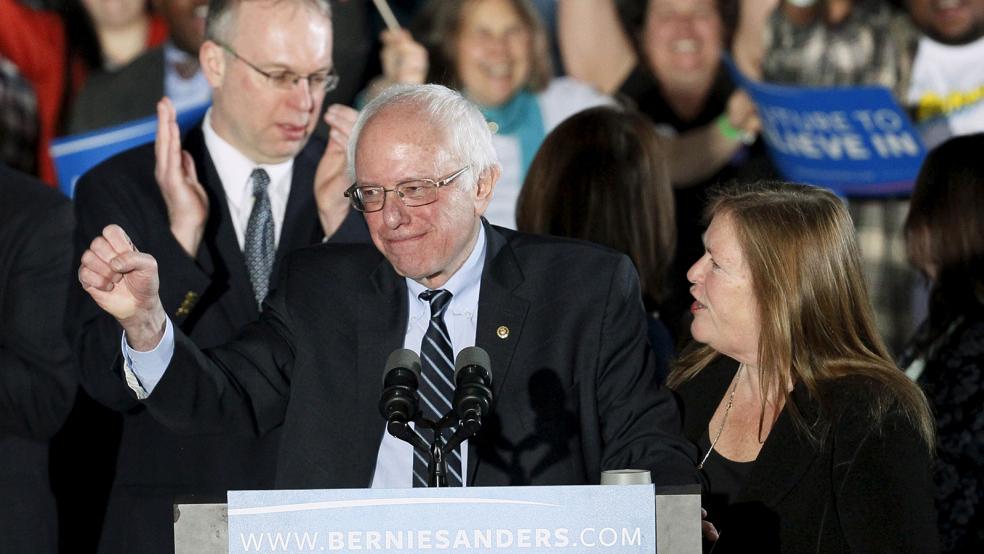Vermont Sen. Bernie Sanders may have trounced Hillary Clinton in last night’s New Hampshire Democratic presidential primary, but he probably won’t come out of the Granite State with more delegates than Clinton.
Sanders crushed Clinton in virtually every demographic group, taking 60 percent of the overall vote to her 38 percent. But when the New Hampshire delegation is seated at the Democratic Convention this summer, the number of delegates supporting Clinton could match or even exceed those supporting Sanders. (She currently leads 15-13, with the status of four delegates unknown.)
Related: Sanders’ Landslide Win in New Hampshire Puts Huge Pressure on Clinton
It’s a similar story coming out of Iowa. Clinton barely held off Sanders in the Feb. 1 caucuses there, winning by less than one percentage point. But at the latest count, she has 27 delegates to Sanders’ 21.
This is because the Democratic Party has 712 “superdelegates” scattered across the 50 states. Unlike “pledged” delegates, who are required to support a candidate based on the preferences of primary voters, superdelegates can give their support to any candidate they want.
In the current race, they are expected to overwhelmingly favor Clinton.
On a national scale, Clinton has already secured the support of more than half of the Democrats’ superdelegates. According to the Associated Press, she has 362 committed to her, compared to Sanders’ 8. That means that with the results from Iowa and New Hampshire so far, Clinton is leading Sanders by 392-42.
Related: Madeleine Albright Hurts Clinton’s Campaign – But Not for the Reason You Think
It’s been a long time since the primary system took both parties’ presidential nomination process out of the “smoke-filled room” packed with party insiders, but the Democrats in particular have made sure that the party establishment retains outsized influence on the outcome.
The superdelegates are, almost by definition, part of the party establishment. Some 432 of them are elected members of the Democratic National Committee, 240 are Democrats currently serving in Congress and the remainder are sitting governors and party elders, including former presidents, vice presidents, DNC chairs and selected former members of Congress.
Under the Democratic Party’s primary system, the eventual nominee will need to secure 2,382 of the 4,763 delegates who will be at the convention this summer. That means that in theory, a candidate could win only 41 percent of the delegates allocated by voters but still win the nomination if he or she has the unified support of the superdelegates.
In practice, it doesn’t work that way — Sanders already has a small number of superdelegates on his side. But there is no question that the superdelegate system confers a major advantage to the candidate preferred by the party establishment. It will likely give Clinton a cushion of hundreds of delegates over Sanders.
Related: Why the Working Class Is Choosing Trump and Sanders
There is grumbling about the fairness of the system every time the Democratic Party holds a contested primary. In 2008, Clinton had an advantage over Barack Obama in superdelegate support in the early going, and Democratic and Democratic-leaning independent voters said by a large margin that they would regard a result in which superdelegates overrode the popular vote as “flawed” and “unfair.” (Obama eventually won a majority of both pledged and unpledged delegates.)
Supporters of the system typically argue that the superdelegates are among the most committed members of the party — the people who do most of the day-to-day work to keep it relevant to voters — and that their preferences deserve a degree of respect.
That’s not an argument likely to resonate with Sanders supporters, many of whom are young voters with little experience of political campaigns and little love for the establishment.
If Sanders continues to compete with Clinton in upcoming primaries — a big if, considering that Iowa and New Hampshire offered him very favorable demographics — his supporters will start to take a closer look at the mechanics of the nominating process. And they aren’t going to like what they see.





